 Petzlover
Petzlover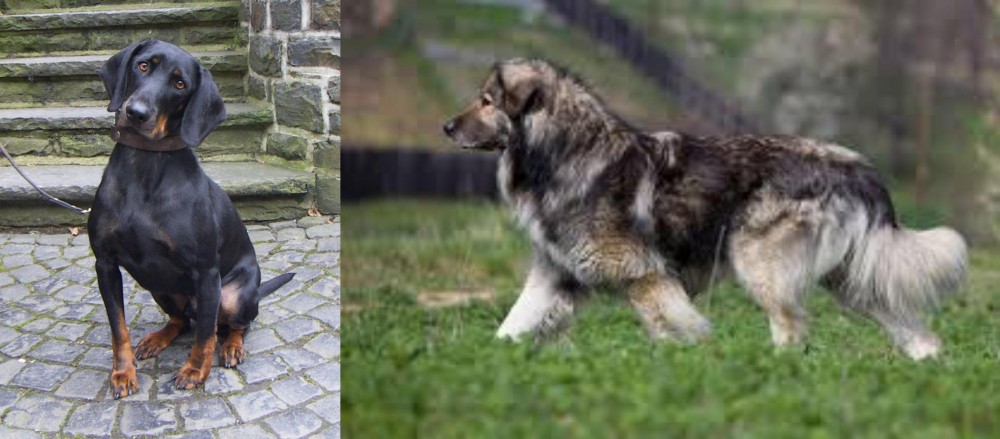 Austrian Black and Tan Hound is originated from Austria but Carpatin is originated from Romania. Austrian Black and Tan Hound may grow 17 cm / 6 inches shorter than Carpatin. Austrian Black and Tan Hound may weigh 50 kg / 110 pounds lesser than Carpatin. Both Austrian Black and Tan Hound and Carpatin has almost same life span. Austrian Black and Tan Hound may have less litter size than Carpatin. Austrian Black and Tan Hound requires High Maintenance. But Carpatin requires Low Maintenance
Austrian Black and Tan Hound is originated from Austria but Carpatin is originated from Romania. Austrian Black and Tan Hound may grow 17 cm / 6 inches shorter than Carpatin. Austrian Black and Tan Hound may weigh 50 kg / 110 pounds lesser than Carpatin. Both Austrian Black and Tan Hound and Carpatin has almost same life span. Austrian Black and Tan Hound may have less litter size than Carpatin. Austrian Black and Tan Hound requires High Maintenance. But Carpatin requires Low Maintenance
 When Celts began settling in Western Europe, they brought their dogs along. The Celtic Hounds had a duty to hunt, guard and fight in battles. They were, most likely, the ancestors of breeds like Greyhounds and Irish Wolfhounds. The original Austrian black and tan hound was created in Austria during the late nineteenth century. They were very specific dog breed because of their sharp nose, agility, speed, trainability and extraordinary persistence while hunting or tracking.
When Celts began settling in Western Europe, they brought their dogs along. The Celtic Hounds had a duty to hunt, guard and fight in battles. They were, most likely, the ancestors of breeds like Greyhounds and Irish Wolfhounds. The original Austrian black and tan hound was created in Austria during the late nineteenth century. They were very specific dog breed because of their sharp nose, agility, speed, trainability and extraordinary persistence while hunting or tracking.
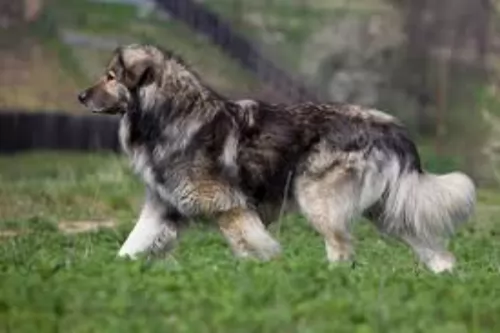 The Carpatin, known also as the Carpathian Shepherd Dog or Romanian Shepherd, is a large breed dog known for his guarding- and watch-dog abilities. Information about these dogs dates back to the 1800s, and much later, in March 1998, fans of the dog founded the Carpathian Shepherd Dogs Club.
The Carpatin, known also as the Carpathian Shepherd Dog or Romanian Shepherd, is a large breed dog known for his guarding- and watch-dog abilities. Information about these dogs dates back to the 1800s, and much later, in March 1998, fans of the dog founded the Carpathian Shepherd Dogs Club.
It is believed that the different Carpathian Shepherd Dog breeds are descendants from dogs that were developed thousands of years ago in Mesopotamia. Documentation of the origins of the dog are rare but it is thought that they are probable descendants of Lupomolossoids. However in 2005, it was finally recognized by the Federation Cynologique Internationale, and in 2006, it was recognized by the United Kennel Club. However, it is still a rare breed outside Romania.
 The Austrian black and tan hound is one of the larger dog breeds. The coat colour of this breed is unique: the coat must be black with small and defined fawn markings. The body, head and legs are black, with dark or fawn markings with the fawn marks above the eyes.
The Austrian black and tan hound is one of the larger dog breeds. The coat colour of this breed is unique: the coat must be black with small and defined fawn markings. The body, head and legs are black, with dark or fawn markings with the fawn marks above the eyes.
The Black and Tan is a smooth coated, slim breed with the broad chest and a wide skull shape. Their teeth meet in a scissor bite. They don’t have very long ears and their tail is long and slightly bent.
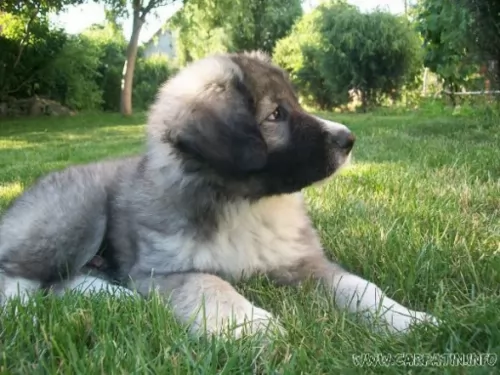 The Carpatin is a large breed dog, standing at 65 to 73cm in height and weighing between 32- and 80kg. The skull of the dog is wide and domed, the ears medium set and floppy. The neck is strong and muscled, the legs strong and straight, the chest deep.
The Carpatin is a large breed dog, standing at 65 to 73cm in height and weighing between 32- and 80kg. The skull of the dog is wide and domed, the ears medium set and floppy. The neck is strong and muscled, the legs strong and straight, the chest deep.
The tail of the Carpatin is long, bushy and high set and his coat is double layered, medium length and pale fawn in color with light grey to black shades being seen as well.
The Carpatin is patient, loving and protective. This is a strong-willed dog who is independent and fairly easy to train as he is intelligent.
It is a good idea to have him trained and socialized as this brings out the best in him. He is a patient and affectionate dog and he’ll get on well with children and tolerate other pets in the home.
They are wary of strangers and become vocal, barking and growling and taking their guard dog role seriously with strangers around.
 The Austrian Black and Tan Hound get along well with strangers, other dogs or any animals. If they are not trained, their instinct to hunt will be a problem for other, smaller dogs and small animals. This is why this breed can’t be a guard dog. He is usually very friendly, and he remains friendly in most situations. It is very easy to train and socialize them, but you must remain firm while teaching them right from wrong. They are not the breed for the indoor, apartments or senior citizens. If you are not able to fulfil his daily need for activity, he can become quite destructive.
The Austrian Black and Tan Hound get along well with strangers, other dogs or any animals. If they are not trained, their instinct to hunt will be a problem for other, smaller dogs and small animals. This is why this breed can’t be a guard dog. He is usually very friendly, and he remains friendly in most situations. It is very easy to train and socialize them, but you must remain firm while teaching them right from wrong. They are not the breed for the indoor, apartments or senior citizens. If you are not able to fulfil his daily need for activity, he can become quite destructive.
Nonexistent for the last 30 years. But, if the dog gets mistreated, neglected or threatened – this breed knows to be aggressive. But, if you are a good and loving owner who makes sure that your dog is well raised, fed, loved, trained and socialized while he is still a pup, you will have no reason for the fear.
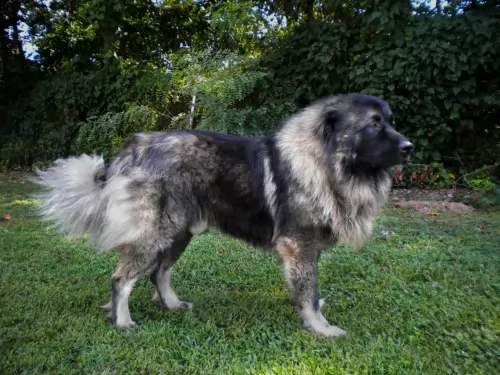 The Carpatin is a big, independent dog who loves his human family. He will guard them too and has all the intelligence and skills to be instinctively alert to danger. Territorial, he makes an excellent watchdog.
The Carpatin is a big, independent dog who loves his human family. He will guard them too and has all the intelligence and skills to be instinctively alert to danger. Territorial, he makes an excellent watchdog.
He isn’t too social around strangers, but with training and socialization he becomes more relaxed and amicable. He responds well to training, especially when he has a firm, strong handler and owner.
Used to being a herding- and working dog, he is happiest when kept busy and isn’t a dog to use essentially for guarding only as he can become aloof and aggressive. Treat him well and have him trained and socialized and you’ll have a wonderful guardian and companion.
 (hip or elbow joint malformation) can happen from injury or overuse of the joints since the Austrian black and tan hound is a runner and jumper.
(hip or elbow joint malformation) can happen from injury or overuse of the joints since the Austrian black and tan hound is a runner and jumper.
They have sensitive ears and they can suffer from ear infections. To avoid this, you must have regular vet checks and have a habit of regular cleaning - hygiene of their ears.
Caused by Demodex canis. If you notice hair loss, redness and scaling you must take your pet to the vet urgently since this disease can be transmitted humans.
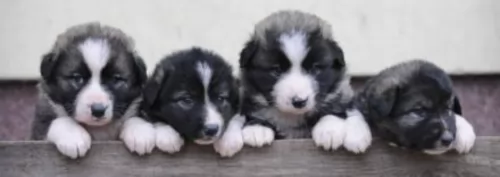 The beautiful Carpatin dog can live to be a healthy 12-14 years if you feed him nutritious foods, provide him with clean water every day, exercise him, give him a dry, warm bed and give him loads of love, attention and care.
The beautiful Carpatin dog can live to be a healthy 12-14 years if you feed him nutritious foods, provide him with clean water every day, exercise him, give him a dry, warm bed and give him loads of love, attention and care.
However every dog can become ill and with the Carpathian Shepherd Dog you certainly want to be aware of ear and eye infections, hip dysplasia and skin disorders.
 Austrian Black and Tan Hounds don’t eat a lot even if you might think that they do. The truth is that they won’t need more than the prescribed portions that can be found in the instructions of high-quality dry dog food per day. All you have to do is make sure they have 3 meals during the day until they are 6 months old, and later they can settle for two meals per day.
Austrian Black and Tan Hounds don’t eat a lot even if you might think that they do. The truth is that they won’t need more than the prescribed portions that can be found in the instructions of high-quality dry dog food per day. All you have to do is make sure they have 3 meals during the day until they are 6 months old, and later they can settle for two meals per day.
Don’t give them the freedom to eat as much as they want. That can cause serious health complications. Their stomachs won’t be able to digest human food because it is usually made with a lot of spices. You can feed them with treats like eggs, fresh cheese, fruits and vegetables are okay as treats but only if these treats make less than 10% of their daily portion.
This playful dog needs the daily dose of outside activities. The grooming is easy but it must be regular. Once-a-week brushing at least is necessary. They don’t need to be bathed regularly but you must check their skin conditions daily since they have high risks of skin diseases. Nails need to be trimmed since they grow too fast and ears need to be cleaned every day to avoid ear infections.
The Austrian Black and Tan Hound are like any hound: they have an excellent sense of smell and they love to explore. They like to run and they can run for miles. Any outside activity will be a good choice. They like to bark and they bark even when they are happy. They are usually friendly towards strangers and other dogs, so the dog park is a good choice as well. They will love being at playgrounds as well since they love children and they can be a great Frisbee partner.
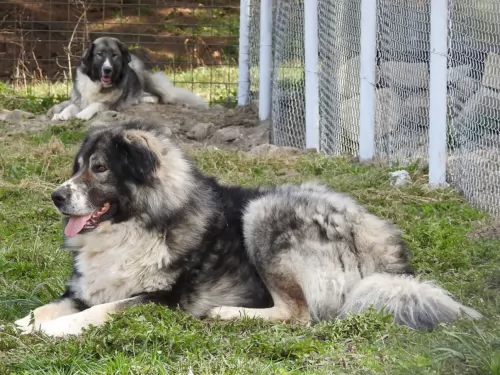 Despite his longish coat, the Carpatin is a low to moderate maintenance dog. To avoid tangles and matting, you’ll need to brush his hair at least twice a week. He won’t however require professional grooming.
Despite his longish coat, the Carpatin is a low to moderate maintenance dog. To avoid tangles and matting, you’ll need to brush his hair at least twice a week. He won’t however require professional grooming.
Dogs with floppy ears will need to have the ears checked to ensure they remain fee of moisture and wax buid-up. The ears can be easily infected when left uncleaned. The nails and teeth should also be checked. Canine toothpaste and brush can help to prevent plaque build-up which can cause gum disease and tooth decay. Not only that, dental disease can lead to other health issues in other parts of the body.
The Carpatin is a medium- to high energy level breed dog and he will therefore need a good amount of exercise to keep him healthy and content. Rope him in to your activities whether you go jogging or cycling. Put him on a leash and take him with – he’ll love it. Dogs who are allowed to be active and part of the family are simply better dogs.
Your Carpatin’s weight, age and activity levels will guide you as to what food is best for him. He needs nutritious food and if you’re unsure how to choose, your veterinarian can advise you on what to look for.
Apart from proteins, your dog needs fats, fiber, carbohydrates, minerals and vitamins. As your dog ages, he or she will go through different life stages, and you want to be sure of ensuring your dog is getting everything he needs to ward of disease and stay happy and healthy.
Make sure your 4-legged canine friend always has a bowl of fresh, cool water available to him.